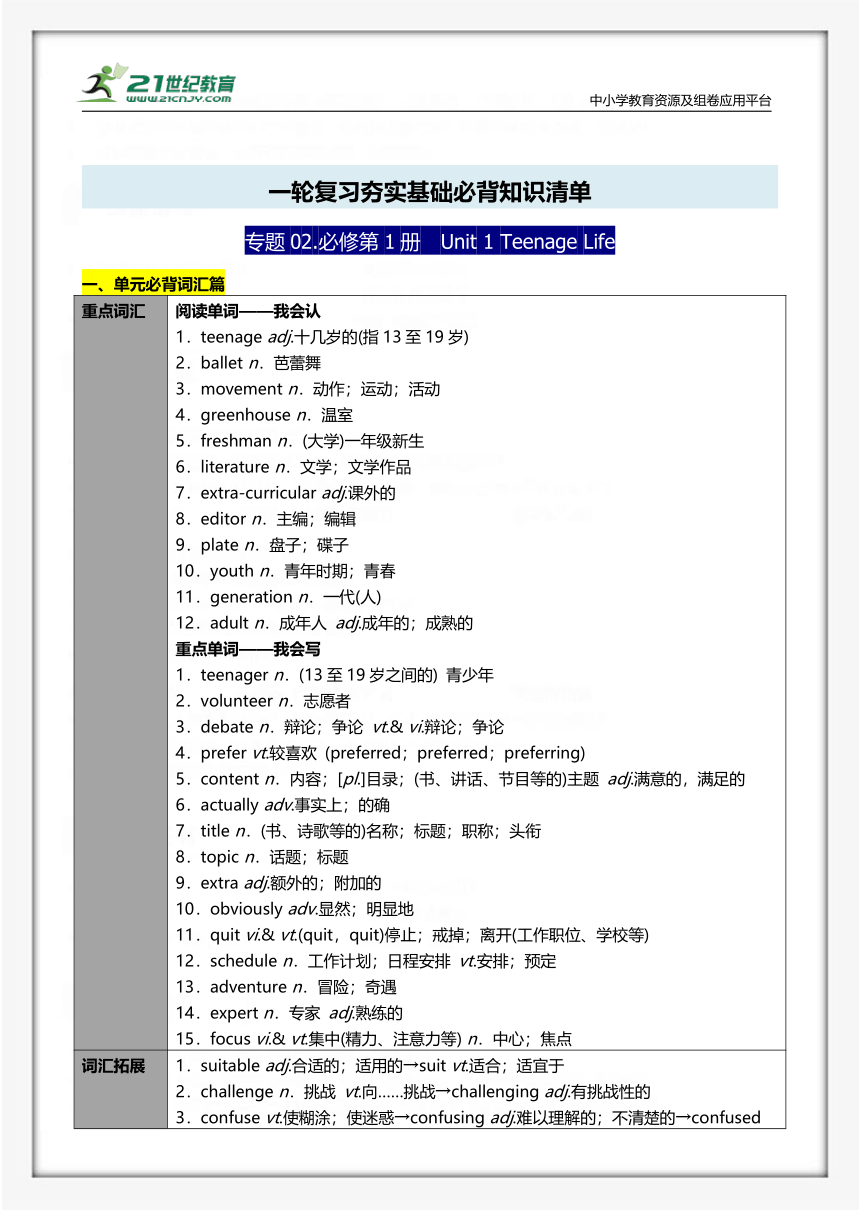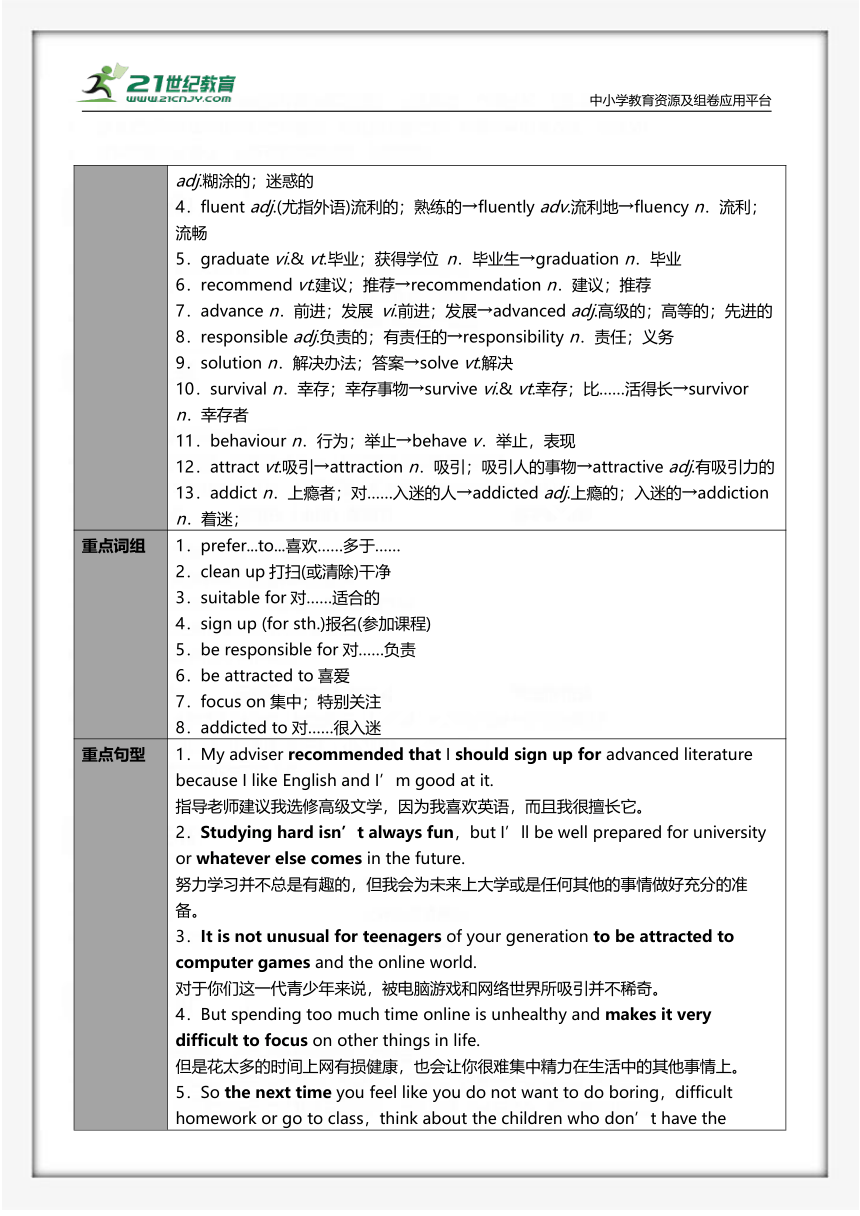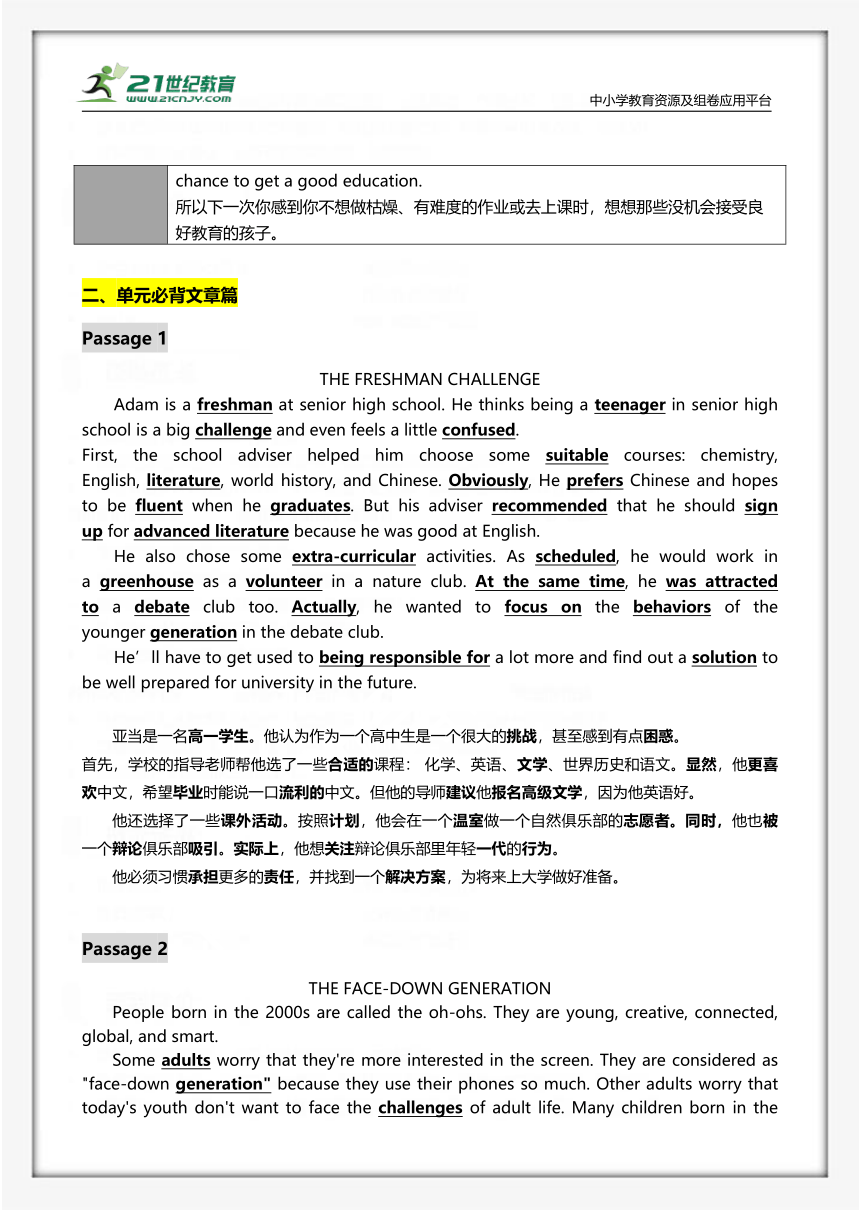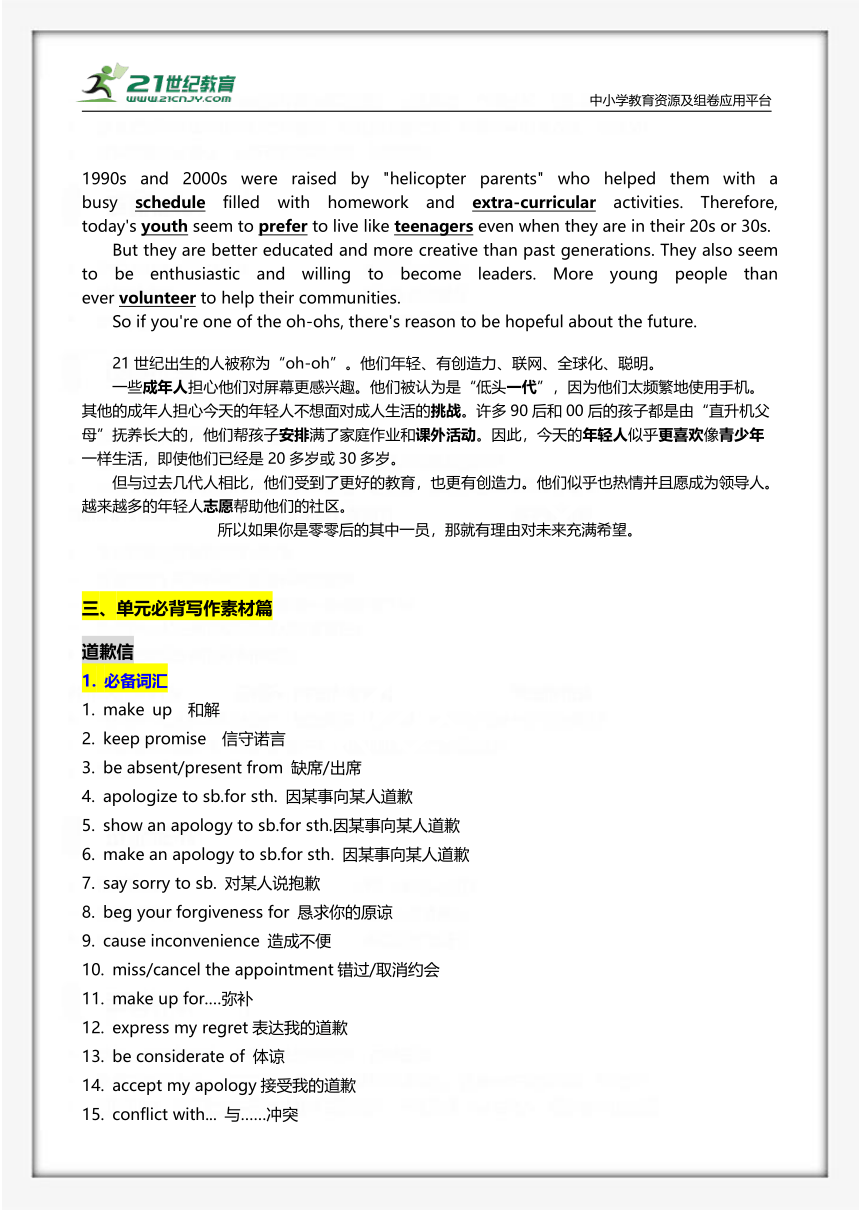(人教版2019)高考英语 一轮复习夯实基础必背知识清单 专题02.必修第1册 Unit 1 Teenage Life
文档属性
| 名称 | (人教版2019)高考英语 一轮复习夯实基础必背知识清单 专题02.必修第1册 Unit 1 Teenage Life |

|
|
| 格式 | docx | ||
| 文件大小 | 113.6KB | ||
| 资源类型 | 试卷 | ||
| 版本资源 | 人教版(2019) | ||
| 科目 | 英语 | ||
| 更新时间 | 2022-11-18 17:16:24 | ||
图片预览




文档简介
中小学教育资源及组卷应用平台
一轮复习夯实基础必背知识清单
专题02.必修第1册 Unit 1 Teenage Life
一、单元必背词汇篇
重点词汇 阅读单词——我会认 1.teenage adj.十几岁的(指13至19岁) 2.ballet n.芭蕾舞 3.movement n.动作;运动;活动 4.greenhouse n.温室 5.freshman n.(大学)一年级新生 6.literature n.文学;文学作品 7.extra-curricular adj.课外的 8.editor n.主编;编辑 9.plate n.盘子;碟子 10.youth n.青年时期;青春 11.generation n.一代(人) 12.adult n.成年人 adj.成年的;成熟的 重点单词——我会写 1.teenager n.(13至19岁之间的) 青少年 2.volunteer n.志愿者 3.debate n.辩论;争论 vt.& vi.辩论;争论 4.prefer vt.较喜欢 (preferred;preferred;preferring) 5.content n.内容;[pl.]目录;(书、讲话、节目等的)主题 adj.满意的,满足的 6.actually adv.事实上;的确 7.title n.(书、诗歌等的)名称;标题;职称;头衔 8.topic n.话题;标题 9.extra adj.额外的;附加的 10.obviously adv.显然;明显地 11.quit vi.& vt.(quit,quit)停止;戒掉;离开(工作职位、学校等) 12.schedule n.工作计划;日程安排 vt.安排;预定 13.adventure n.冒险;奇遇 14.expert n.专家 adj.熟练的 15.focus vi.& vt.集中(精力、注意力等) n.中心;焦点
词汇拓展 1.suitable adj.合适的;适用的→suit vt.适合;适宜于 2.challenge n.挑战 vt.向……挑战→challenging adj.有挑战性的 3.confuse vt.使糊涂;使迷惑→confusing adj.难以理解的;不清楚的→confused adj.糊涂的;迷惑的 4.fluent adj.(尤指外语)流利的;熟练的→fluently adv.流利地→fluency n.流利;流畅 5.graduate vi.& vt.毕业;获得学位 n.毕业生→graduation n.毕业 6.recommend vt.建议;推荐→recommendation n.建议;推荐 7.advance n.前进;发展 vi.前进;发展→advanced adj.高级的;高等的;先进的 8.responsible adj.负责的;有责任的→responsibility n.责任;义务 9.solution n.解决办法;答案→solve vt.解决 10.survival n.幸存;幸存事物→survive vi.& vt.幸存;比……活得长→survivor n.幸存者 11.behaviour n.行为;举止→behave v.举止,表现 12.attract vt.吸引→attraction n.吸引;吸引人的事物→attractive adj.有吸引力的 13.addict n.上瘾者;对……入迷的人→addicted adj.上瘾的;入迷的→addiction n.着迷;
重点词组 1.prefer...to...喜欢……多于…… 2.clean up打扫(或清除)干净 3.suitable for对……适合的 4.sign up (for sth.)报名(参加课程) 5.be responsible for对……负责 6.be attracted to喜爱 7.focus on集中;特别关注 8.addicted to对……很入迷
重点句型 1.My adviser recommended that I should sign up for advanced literature because I like English and I’m good at it. 指导老师建议我选修高级文学,因为我喜欢英语,而且我很擅长它。 2.Studying hard isn’t always fun,but I’ll be well prepared for university or whatever else comes in the future. 努力学习并不总是有趣的,但我会为未来上大学或是任何其他的事情做好充分的准备。 3.It is not unusual for teenagers of your generation to be attracted to computer games and the online world. 对于你们这一代青少年来说,被电脑游戏和网络世界所吸引并不稀奇。 4.But spending too much time online is unhealthy and makes it very difficult to focus on other things in life. 但是花太多的时间上网有损健康,也会让你很难集中精力在生活中的其他事情上。 5.So the next time you feel like you do not want to do boring,difficult homework or go to class,think about the children who don’t have the chance to get a good education. 所以下一次你感到你不想做枯燥、有难度的作业或去上课时,想想那些没机会接受良好教育的孩子。
单元必背文章篇
Passage 1
THE FRESHMAN CHALLENGE
Adam is a freshman at senior high school. He thinks being a teenager in senior high school is a big challenge and even feels a little confused.
First, the school adviser helped him choose some suitable courses: chemistry, English, literature, world history, and Chinese. Obviously, He prefers Chinese and hopes to be fluent when he graduates. But his adviser recommended that he should sign up for advanced literature because he was good at English.
He also chose some extra-curricular activities. As scheduled, he would work in a greenhouse as a volunteer in a nature club. At the same time, he was attracted to a debate club too. Actually, he wanted to focus on the behaviors of the younger generation in the debate club.
He’ll have to get used to being responsible for a lot more and find out a solution to be well prepared for university in the future.
亚当是一名高一学生。他认为作为一个高中生是一个很大的挑战,甚至感到有点困惑。
首先,学校的指导老师帮他选了一些合适的课程: 化学、英语、文学、世界历史和语文。显然,他更喜欢中文,希望毕业时能说一口流利的中文。但他的导师建议他报名高级文学,因为他英语好。
他还选择了一些课外活动。按照计划,他会在一个温室做一个自然俱乐部的志愿者。同时,他也被一个辩论俱乐部吸引。实际上,他想关注辩论俱乐部里年轻一代的行为。
他必须习惯承担更多的责任,并找到一个解决方案,为将来上大学做好准备。
Passage 2
THE FACE-DOWN GENERATION
People born in the 2000s are called the oh-ohs. They are young, creative, connected, global, and smart.
Some adults worry that they're more interested in the screen. They are considered as "face-down generation" because they use their phones so much. Other adults worry that today's youth don't want to face the challenges of adult life. Many children born in the 1990s and 2000s were raised by "helicopter parents" who helped them with a busy schedule filled with homework and extra-curricular activities. Therefore, today's youth seem to prefer to live like teenagers even when they are in their 20s or 30s.
But they are better educated and more creative than past generations. They also seem to be enthusiastic and willing to become leaders. More young people than ever volunteer to help their communities.
So if you're one of the oh-ohs, there's reason to be hopeful about the future.
21世纪出生的人被称为“oh-oh”。他们年轻、有创造力、联网、全球化、聪明。
一些成年人担心他们对屏幕更感兴趣。他们被认为是“低头一代”,因为他们太频繁地使用手机。其他的成年人担心今天的年轻人不想面对成人生活的挑战。许多90后和00后的孩子都是由“直升机父母”抚养长大的,他们帮孩子安排满了家庭作业和课外活动。因此,今天的年轻人似乎更喜欢像青少年一样生活,即使他们已经是20多岁或30多岁。
但与过去几代人相比,他们受到了更好的教育,也更有创造力。他们似乎也热情并且愿成为领导人。越来越多的年轻人志愿帮助他们的社区。
所以如果你是零零后的其中一员,那就有理由对未来充满希望。
三、单元必背写作素材篇
道歉信
必备词汇
make up 和解
keep promise 信守诺言
be absent/present from 缺席/出席
apologize to sb.for sth. 因某事向某人道歉
show an apology to sb.for sth.因某事向某人道歉
make an apology to sb.for sth. 因某事向某人道歉
say sorry to sb. 对某人说抱歉
beg your forgiveness for 恳求你的原谅
cause inconvenience 造成不便
miss/cancel the appointment错过/取消约会
make up for.…弥补
express my regret表达我的道歉
be considerate of 体谅
accept my apology接受我的道歉
conflict with... 与……冲突
have no choice/option but to do sth.除了做某事别无选择
make a choice选择
2. 高分句式
1. 道歉信中开头段常用句式和套话
I am writing this letter to express my regret…
我写这封信是想表达我的遗憾……
I am writing to apologize for…
我写信是为……道歉。
I would like to give you my apology for…
我想……向你道歉。
I am very sorry to say that…
我很抱歉……
I must apologize about (not) doing sth…
对于做了/没做……,我必须道歉。
Please accept my sincere apology for…
请接受我对于^的真诚道歉。
I am writing to say sorry for…
我写信是想对……说抱歉。
I am terribly sorry, but…
我很抱歉,但是……
2.中间段:陈述理由+补救措施
陈述理由:
理由:I should have been able to attend your lecture, but due to the fact that something urgent happened, I'll have to take the place of my mother to pick my aunt up at the airport, whose flight happens to arrive on Saturday night. And it's the first time that my aunt has returned to my hometown since she studied abroad several years ago. So I have no choice/option but to cancel the appointment with you.
我本应该参加你的讲座,但由于发生了紧急的事情,我要代替母亲到机场接我阿姨,她的航班在周六晚抵达,这是阿姨自从几年前去留学第一次回国。我别无选择只好取消和你的约会。
补救措施:
1.I want you to know how bad we feel about it and to assure you that it will happen again.
我想让你知道我们有多难过,我向你保证这不会再发生了。
2.I hope that this does not cause you too much inconvenience.
我希望这不会给你带来太多的不便。
3.It would be very kind( considerate)of you to give me another chance to do sth. I promise it will never happen again.
你太好了,再给我一次机会做某事。我保证不会再发生这种事情。
4.If it is convenient for you, let's have another appointment to do sth.
如果方便的话,我们再约去做某事。
5.Would you mind if I change the appointment time
你会介意我改变约会的时间吗
6.By the way, can we have dinner together some time next week
顺便说一下,我们在下周的某个时间一起吃晚饭好吗
7.ls it possible that I make up for the loss by doing sth.
可能让我做某事来弥补损失吗
3.道歉信中结尾段常用句式和套话
Once again, I am sorry for any inconvenience caused.
我对于所造成的任何不便再次道歉。
Please allow me to say sorry again.
请允许我再一次说抱歉。
Hope you can accept my apologies and understand my situation.
希望你们能够接受我的道歉,理解我的处境。
I sincerely hope that you will be able to think in my position and accept my apologies.
我真诚的希望你能够站在我的位置想一想,并且接受我的道歉。
I want to let you know how regretful I am feeling now.
我想让你知道我现在感觉多么的遗憾。
I am sorry that I can’t… but trust that you will be able to understand.
很抱歉我不能……,但我相信,你会理解的。
四、单元必背语法篇
Grammar 名词短语 形容词短语 副词短语
(一)名词短语中修饰名词的有:形容词、数词、代词、名词、分词、介词短语、不定式或副词
1.形容词修饰名词The_little_boy needs a_blue_pen.小男孩需要一支蓝色的钢笔。
2.数词修饰名词相当于形容词There are two_boys in the room.房间里有两个男孩。
3.代词或名词所有格修饰名词His_name is Tom.他的名字是汤姆。
There are two_boys_of_Toms there.那儿有汤姆家的两个男孩。
4.介词短语修饰名词The_boy_in_blue is Tom.穿蓝色衣服的孩子是汤姆。
5.名词修饰名词There is only one ball pen in the_pencil_box.这铅笔盒里只有一支圆珠笔。
6.副词修饰名词The_best_boy_here is Tom.这里最棒的男孩是汤姆。
7.不定式修饰名词The_boy_to_write_this_letter needs a pen.写这封信的男孩需要一支钢笔。
8.分词(短语)修饰名词
The_smiling_boy needs a_pen_bought_by_his_mother.那个微笑的男孩需要一支他妈妈买的钢笔。
(二)名词短语中修饰名词的词或短语其位置一般有两种:用在名词之前的叫前置定语,用在名词之后的叫后置定语
1.定语前置
在英语里,一般定语前置时的次序为:限定词、形容词、分词、动名词和名词性定语,但当几个形容词同时出现在名词短语之前,应注意其次序,其形容词遵循的次序为:限观形龄色国材,其指:限定词(一般指数量);外观(美丽等);形状(大小,高矮,肥瘦);年龄;颜色;国籍;材料;用途。如:
an_interesting_little_red_French_oil painting 一幅小的有趣的法国红色油画
2.定语后置
(1)短语作定语一般在名词之后
He gave me a basket full_of_eggs. 他给我一个装满鸡蛋的篮子。
(2)副词作定语一般在名词之后
The_people_here are very friendly. 这里的人很友好。
1.形容词短语,通常是副词修饰形容词,副词修饰形容词主要见于表示程度。如:
I was rather_angry at what he said。我对他说的话相当生气。
Mary and Jane are quite_different. 玛丽与简大不一样。
The music is too_loud;_please turn it down. 这音乐太吵人了,请把音量关小一点。
It's difficult_enough,_but it could have been worse. 这事情够困难的了,本来可能会更糟呢。
Let's go shopping now. The shops should be fairly_empty. 我们去商店买东西吧。商店里人不会太多。
2.副词修饰形容词,有时也表示方面或方式等。如:
I am economically_independent. 我在经济方面是独立的。
The book is historically_inaccurate. 这本书从历史上说不准确。
副词短语,通常是副词修饰副词,主要见于表示程度。此时,起修饰作用的副词常见的有almost, fairly, pretty, rather, quite, very, much, too, greatly, nearly, half, highly, awfully, deeply, partly, perfectly, really 等。如:
He was back quite_quickly. 他很快就回来了。
They thought very_highly of him. 他们对他评价很高。
I think you have done your work very_finely. 我认为你工作干得不错。
He spoke too_quickly for me to understand. 他说得太快了,我听不懂。
Having lived there for two years, he knew the place quite_well. 他在那里住过两年,对这地方很熟悉。
一轮复习夯实基础必背知识清单
专题02.必修第1册 Unit 1 Teenage Life
一、单元必背词汇篇
重点词汇 阅读单词——我会认 1.teenage adj.十几岁的(指13至19岁) 2.ballet n.芭蕾舞 3.movement n.动作;运动;活动 4.greenhouse n.温室 5.freshman n.(大学)一年级新生 6.literature n.文学;文学作品 7.extra-curricular adj.课外的 8.editor n.主编;编辑 9.plate n.盘子;碟子 10.youth n.青年时期;青春 11.generation n.一代(人) 12.adult n.成年人 adj.成年的;成熟的 重点单词——我会写 1.teenager n.(13至19岁之间的) 青少年 2.volunteer n.志愿者 3.debate n.辩论;争论 vt.& vi.辩论;争论 4.prefer vt.较喜欢 (preferred;preferred;preferring) 5.content n.内容;[pl.]目录;(书、讲话、节目等的)主题 adj.满意的,满足的 6.actually adv.事实上;的确 7.title n.(书、诗歌等的)名称;标题;职称;头衔 8.topic n.话题;标题 9.extra adj.额外的;附加的 10.obviously adv.显然;明显地 11.quit vi.& vt.(quit,quit)停止;戒掉;离开(工作职位、学校等) 12.schedule n.工作计划;日程安排 vt.安排;预定 13.adventure n.冒险;奇遇 14.expert n.专家 adj.熟练的 15.focus vi.& vt.集中(精力、注意力等) n.中心;焦点
词汇拓展 1.suitable adj.合适的;适用的→suit vt.适合;适宜于 2.challenge n.挑战 vt.向……挑战→challenging adj.有挑战性的 3.confuse vt.使糊涂;使迷惑→confusing adj.难以理解的;不清楚的→confused adj.糊涂的;迷惑的 4.fluent adj.(尤指外语)流利的;熟练的→fluently adv.流利地→fluency n.流利;流畅 5.graduate vi.& vt.毕业;获得学位 n.毕业生→graduation n.毕业 6.recommend vt.建议;推荐→recommendation n.建议;推荐 7.advance n.前进;发展 vi.前进;发展→advanced adj.高级的;高等的;先进的 8.responsible adj.负责的;有责任的→responsibility n.责任;义务 9.solution n.解决办法;答案→solve vt.解决 10.survival n.幸存;幸存事物→survive vi.& vt.幸存;比……活得长→survivor n.幸存者 11.behaviour n.行为;举止→behave v.举止,表现 12.attract vt.吸引→attraction n.吸引;吸引人的事物→attractive adj.有吸引力的 13.addict n.上瘾者;对……入迷的人→addicted adj.上瘾的;入迷的→addiction n.着迷;
重点词组 1.prefer...to...喜欢……多于…… 2.clean up打扫(或清除)干净 3.suitable for对……适合的 4.sign up (for sth.)报名(参加课程) 5.be responsible for对……负责 6.be attracted to喜爱 7.focus on集中;特别关注 8.addicted to对……很入迷
重点句型 1.My adviser recommended that I should sign up for advanced literature because I like English and I’m good at it. 指导老师建议我选修高级文学,因为我喜欢英语,而且我很擅长它。 2.Studying hard isn’t always fun,but I’ll be well prepared for university or whatever else comes in the future. 努力学习并不总是有趣的,但我会为未来上大学或是任何其他的事情做好充分的准备。 3.It is not unusual for teenagers of your generation to be attracted to computer games and the online world. 对于你们这一代青少年来说,被电脑游戏和网络世界所吸引并不稀奇。 4.But spending too much time online is unhealthy and makes it very difficult to focus on other things in life. 但是花太多的时间上网有损健康,也会让你很难集中精力在生活中的其他事情上。 5.So the next time you feel like you do not want to do boring,difficult homework or go to class,think about the children who don’t have the chance to get a good education. 所以下一次你感到你不想做枯燥、有难度的作业或去上课时,想想那些没机会接受良好教育的孩子。
单元必背文章篇
Passage 1
THE FRESHMAN CHALLENGE
Adam is a freshman at senior high school. He thinks being a teenager in senior high school is a big challenge and even feels a little confused.
First, the school adviser helped him choose some suitable courses: chemistry, English, literature, world history, and Chinese. Obviously, He prefers Chinese and hopes to be fluent when he graduates. But his adviser recommended that he should sign up for advanced literature because he was good at English.
He also chose some extra-curricular activities. As scheduled, he would work in a greenhouse as a volunteer in a nature club. At the same time, he was attracted to a debate club too. Actually, he wanted to focus on the behaviors of the younger generation in the debate club.
He’ll have to get used to being responsible for a lot more and find out a solution to be well prepared for university in the future.
亚当是一名高一学生。他认为作为一个高中生是一个很大的挑战,甚至感到有点困惑。
首先,学校的指导老师帮他选了一些合适的课程: 化学、英语、文学、世界历史和语文。显然,他更喜欢中文,希望毕业时能说一口流利的中文。但他的导师建议他报名高级文学,因为他英语好。
他还选择了一些课外活动。按照计划,他会在一个温室做一个自然俱乐部的志愿者。同时,他也被一个辩论俱乐部吸引。实际上,他想关注辩论俱乐部里年轻一代的行为。
他必须习惯承担更多的责任,并找到一个解决方案,为将来上大学做好准备。
Passage 2
THE FACE-DOWN GENERATION
People born in the 2000s are called the oh-ohs. They are young, creative, connected, global, and smart.
Some adults worry that they're more interested in the screen. They are considered as "face-down generation" because they use their phones so much. Other adults worry that today's youth don't want to face the challenges of adult life. Many children born in the 1990s and 2000s were raised by "helicopter parents" who helped them with a busy schedule filled with homework and extra-curricular activities. Therefore, today's youth seem to prefer to live like teenagers even when they are in their 20s or 30s.
But they are better educated and more creative than past generations. They also seem to be enthusiastic and willing to become leaders. More young people than ever volunteer to help their communities.
So if you're one of the oh-ohs, there's reason to be hopeful about the future.
21世纪出生的人被称为“oh-oh”。他们年轻、有创造力、联网、全球化、聪明。
一些成年人担心他们对屏幕更感兴趣。他们被认为是“低头一代”,因为他们太频繁地使用手机。其他的成年人担心今天的年轻人不想面对成人生活的挑战。许多90后和00后的孩子都是由“直升机父母”抚养长大的,他们帮孩子安排满了家庭作业和课外活动。因此,今天的年轻人似乎更喜欢像青少年一样生活,即使他们已经是20多岁或30多岁。
但与过去几代人相比,他们受到了更好的教育,也更有创造力。他们似乎也热情并且愿成为领导人。越来越多的年轻人志愿帮助他们的社区。
所以如果你是零零后的其中一员,那就有理由对未来充满希望。
三、单元必背写作素材篇
道歉信
必备词汇
make up 和解
keep promise 信守诺言
be absent/present from 缺席/出席
apologize to sb.for sth. 因某事向某人道歉
show an apology to sb.for sth.因某事向某人道歉
make an apology to sb.for sth. 因某事向某人道歉
say sorry to sb. 对某人说抱歉
beg your forgiveness for 恳求你的原谅
cause inconvenience 造成不便
miss/cancel the appointment错过/取消约会
make up for.…弥补
express my regret表达我的道歉
be considerate of 体谅
accept my apology接受我的道歉
conflict with... 与……冲突
have no choice/option but to do sth.除了做某事别无选择
make a choice选择
2. 高分句式
1. 道歉信中开头段常用句式和套话
I am writing this letter to express my regret…
我写这封信是想表达我的遗憾……
I am writing to apologize for…
我写信是为……道歉。
I would like to give you my apology for…
我想……向你道歉。
I am very sorry to say that…
我很抱歉……
I must apologize about (not) doing sth…
对于做了/没做……,我必须道歉。
Please accept my sincere apology for…
请接受我对于^的真诚道歉。
I am writing to say sorry for…
我写信是想对……说抱歉。
I am terribly sorry, but…
我很抱歉,但是……
2.中间段:陈述理由+补救措施
陈述理由:
理由:I should have been able to attend your lecture, but due to the fact that something urgent happened, I'll have to take the place of my mother to pick my aunt up at the airport, whose flight happens to arrive on Saturday night. And it's the first time that my aunt has returned to my hometown since she studied abroad several years ago. So I have no choice/option but to cancel the appointment with you.
我本应该参加你的讲座,但由于发生了紧急的事情,我要代替母亲到机场接我阿姨,她的航班在周六晚抵达,这是阿姨自从几年前去留学第一次回国。我别无选择只好取消和你的约会。
补救措施:
1.I want you to know how bad we feel about it and to assure you that it will happen again.
我想让你知道我们有多难过,我向你保证这不会再发生了。
2.I hope that this does not cause you too much inconvenience.
我希望这不会给你带来太多的不便。
3.It would be very kind( considerate)of you to give me another chance to do sth. I promise it will never happen again.
你太好了,再给我一次机会做某事。我保证不会再发生这种事情。
4.If it is convenient for you, let's have another appointment to do sth.
如果方便的话,我们再约去做某事。
5.Would you mind if I change the appointment time
你会介意我改变约会的时间吗
6.By the way, can we have dinner together some time next week
顺便说一下,我们在下周的某个时间一起吃晚饭好吗
7.ls it possible that I make up for the loss by doing sth.
可能让我做某事来弥补损失吗
3.道歉信中结尾段常用句式和套话
Once again, I am sorry for any inconvenience caused.
我对于所造成的任何不便再次道歉。
Please allow me to say sorry again.
请允许我再一次说抱歉。
Hope you can accept my apologies and understand my situation.
希望你们能够接受我的道歉,理解我的处境。
I sincerely hope that you will be able to think in my position and accept my apologies.
我真诚的希望你能够站在我的位置想一想,并且接受我的道歉。
I want to let you know how regretful I am feeling now.
我想让你知道我现在感觉多么的遗憾。
I am sorry that I can’t… but trust that you will be able to understand.
很抱歉我不能……,但我相信,你会理解的。
四、单元必背语法篇
Grammar 名词短语 形容词短语 副词短语
(一)名词短语中修饰名词的有:形容词、数词、代词、名词、分词、介词短语、不定式或副词
1.形容词修饰名词The_little_boy needs a_blue_pen.小男孩需要一支蓝色的钢笔。
2.数词修饰名词相当于形容词There are two_boys in the room.房间里有两个男孩。
3.代词或名词所有格修饰名词His_name is Tom.他的名字是汤姆。
There are two_boys_of_Toms there.那儿有汤姆家的两个男孩。
4.介词短语修饰名词The_boy_in_blue is Tom.穿蓝色衣服的孩子是汤姆。
5.名词修饰名词There is only one ball pen in the_pencil_box.这铅笔盒里只有一支圆珠笔。
6.副词修饰名词The_best_boy_here is Tom.这里最棒的男孩是汤姆。
7.不定式修饰名词The_boy_to_write_this_letter needs a pen.写这封信的男孩需要一支钢笔。
8.分词(短语)修饰名词
The_smiling_boy needs a_pen_bought_by_his_mother.那个微笑的男孩需要一支他妈妈买的钢笔。
(二)名词短语中修饰名词的词或短语其位置一般有两种:用在名词之前的叫前置定语,用在名词之后的叫后置定语
1.定语前置
在英语里,一般定语前置时的次序为:限定词、形容词、分词、动名词和名词性定语,但当几个形容词同时出现在名词短语之前,应注意其次序,其形容词遵循的次序为:限观形龄色国材,其指:限定词(一般指数量);外观(美丽等);形状(大小,高矮,肥瘦);年龄;颜色;国籍;材料;用途。如:
an_interesting_little_red_French_oil painting 一幅小的有趣的法国红色油画
2.定语后置
(1)短语作定语一般在名词之后
He gave me a basket full_of_eggs. 他给我一个装满鸡蛋的篮子。
(2)副词作定语一般在名词之后
The_people_here are very friendly. 这里的人很友好。
1.形容词短语,通常是副词修饰形容词,副词修饰形容词主要见于表示程度。如:
I was rather_angry at what he said。我对他说的话相当生气。
Mary and Jane are quite_different. 玛丽与简大不一样。
The music is too_loud;_please turn it down. 这音乐太吵人了,请把音量关小一点。
It's difficult_enough,_but it could have been worse. 这事情够困难的了,本来可能会更糟呢。
Let's go shopping now. The shops should be fairly_empty. 我们去商店买东西吧。商店里人不会太多。
2.副词修饰形容词,有时也表示方面或方式等。如:
I am economically_independent. 我在经济方面是独立的。
The book is historically_inaccurate. 这本书从历史上说不准确。
副词短语,通常是副词修饰副词,主要见于表示程度。此时,起修饰作用的副词常见的有almost, fairly, pretty, rather, quite, very, much, too, greatly, nearly, half, highly, awfully, deeply, partly, perfectly, really 等。如:
He was back quite_quickly. 他很快就回来了。
They thought very_highly of him. 他们对他评价很高。
I think you have done your work very_finely. 我认为你工作干得不错。
He spoke too_quickly for me to understand. 他说得太快了,我听不懂。
Having lived there for two years, he knew the place quite_well. 他在那里住过两年,对这地方很熟悉。
